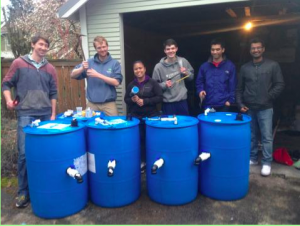“In the US, 40% of food produced goes to waste” (Sustainabletable.org). Is the food waste crisis underestimating?
My group was eager to investigate food waste issues on campus, particularly UW dining, Starbuck and UW Sustainability. Hence, we started to interview experts in the field to clearly understand what the University of Washington has done in responsibility for food waste issues. We decided to insert social media tool, Twitter, as an action project. By this way, readers will signal large corporation and increase awareness of the large corporations such as UW dining, Starbucks by tweeting. ( Here is our website link: https://foodwastebusters.wordpress.com/)

Source: Whisper Christopher, CFS The UW Sustainability
However, we are only able to interview with Whisper St Christophe at Campus Sustainability Fund Outreach (CFS), UW sustainability. To explore what types of projects that they have funded in related to food waste issues at the University of Washington. The CFS is only funding for the student-led project, which encourages students creating a sustainable campus and foster environmentally conscious university culture. We found that they are actually funded for food waste project related, which is UW Anaerobic Digester and Biogas Food Cart project. These project’s mission statement is to implement a biogas digester to transform organic matter and food waste into alternative fuels such as fertilizer, composers, and even electricity. In order to tackle food waste problem, each individual needs to come together to resolve the issues. Again, collective action is strongly involved in the projects such as technical skill from students and faculties in the UW Civil and Environmental Engineering, UW foster school of business ‘s students, UW sustainability, UW dining and others environment related departments. In related to politics, when I asked Whisper’s opinion that who do you think should be responsible for food waste issues? She said that even though the administrators are in charge, students should be the ones leading the change. Therefore, the funding program is designed for only the student-led organization, to empower the students who want to make the UW campus cleaner and more sustainable in their efforts to create a positive impact on our environment.

Source: The biodigest Food Cart project
Why food waste even exist in the first world country such as the US?
The rationale behind food waste is due to the industrialized food agriculture with mass production, overproducing food. According to the book of Michael Carolan, the age of nutritionism leads food industry becomes more industrialized, processed food and food capitalism. Hence, the US dominate global food market with 20% of export earnings from agriculture, the largest exporter of corn, rice, soy and heavily subsidized ( Industrialization lecture). This leads farmers to create surpluses which the government buys up and it goes to waste.
However, where will cheap surplus food?
It either dumps into landfill or donates for food aid relief program. The UN World Food Programme was originally created to distribute massive surpluses of food from donors (Carolan, 2011). However, a lot of money was spent on food aid is wasted on transportation, USAIDS food aid budget in 2005 was $1.6 billion, only 40% went to pay on food.
Wasting food is wasting energy, particularly oil. As we have learned in The Oil We Eat shows that our food depends on oil. The oil is used to run the mechanical machine in commercial agriculture, vehicles engine to transport food, petroleum-based fertilizers, pesticides. Moreover, Brown claims that using biofuels (palm oil, corn oil) can create economic distresses in the form of rising food prices. These economic constraints translate into the political stress, putting governments in some countries under extreme pressure.

Sammy,
I really liked the creative work that was put into your project! Developed nations dumping their surplus of food into developing nations is an act that really stuck in my mind throughout the course. When writing about food aid, I noticed you talked specifically about the budget that was allocated by the US to transporting the surplus of food. I would be very interested to hear your thoughts on food aid given by the US in regard to the effects on developing nations.
Great project!
Sammy,
Seeing as we are in the Starbucks capital of the country, I think this was an important project to raise awareness about the amount of food waste we produce each day. As a Starbucks employee, it’s heartbreaking to see the amount of food that goes out each day. With the new launch of the Mercato line in Seattle, it’s great seeing how the fresh food is donated. However, there are nights where the food collectors don’t come, and we still have to toss bag-fulls of fresh food. This includes the items in the pastry case, and often a lot of other pastries. Certainly, they’re not the most nutritious food items we could be giving out, but it’s something.
I also work at a restaurant, and although we make food with every order to go, there is still an astounding amount of food that goes to waste. Perhaps a few things we could do to combat this problem would somehow be by decreasing the portion sizes of all of our plates by just a few margins. Our burgers look great but they don’t really need to be the size of a child’s head. Also, the amount of fries we get rid of is ridiculous. Smaller portions may be helpful in decreasing the waste we see every day. Potentially also offering the customers a chance to donate their unwanted food could be useful in helping distribute food more evenly. Either way, food waste is something that needs to be addressed and looked at individually by individual companies.
Loved your project, thanks for taking the time to raise this awareness!
Emily